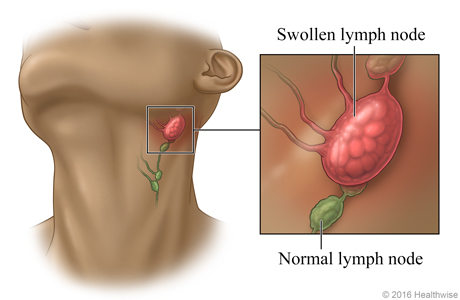Swollen lymph nodes (swollen glands)

Lymph nodes are small, bean-shaped structures in the body that are sometimes incorrectly called "glands." They are part of the lymphatic system, which carries lymph fluid, nutrients, and waste material between the body tissues and the bloodstream. The lymphatic system is part of the immune system, the body's defense system against disease.
Lymph nodes may be found separately or in groups. They may be as small as the head of a pin or as large as an olive. Groups of lymph nodes can be felt in the neck, groin, and underarms. Many lymph nodes in the body cannot be felt.
When a part of the body is infected, the nearby lymph nodes can become swollen. For example, if a person has a throat infection, the lymph nodes in the neck may swell and become tender.
How are swollen lymph nodes treated?
Treatment for swollen glands focuses on treating the cause. For example, a bacterial infection may be treated with antibiotics, while a viral infection often goes away on its own. If cancer is suspected, a biopsy may be done to confirm the diagnosis.
Any swollen lymph nodes that don't go away or return to normal size within about a month should be checked by your doctor.
How can you care for lymphadenitis?
- Be safe with medicines.
- If your doctor prescribed antibiotics, take them as directed. Do not stop taking them just because you feel better. You need to take the full course of antibiotics.
- Ask your doctor if you can take an over-the-counter pain medicine, such as acetaminophen (Tylenol), ibuprofen (Advil, Motrin), or naproxen (Aleve). Read and follow all instructions on the label.
- If you have pain, try a warm compress. Soak a towel or washcloth in warm water. Wring it out, and place it on the affected skin.
- Do not squeeze, drain, or puncture a painful lump. Doing this can irritate or inflame the lump, push any existing infection deeper into the skin, or cause severe bleeding.
Swollen lymph nodes: When to call
Call your doctor now or seek immediate medical care if:
- You have worse symptoms of infection, such as:
- Increased pain, swelling, warmth, or redness.
- Red streaks leading from the area.
- Pus draining from the area.
- A fever.
Watch closely for changes in your health, and be sure to contact your doctor if:
- Your lymph nodes do not get smaller or do not return to normal.
- You do not get better as expected.
©2011-2026 Healthwise, Incorporated
